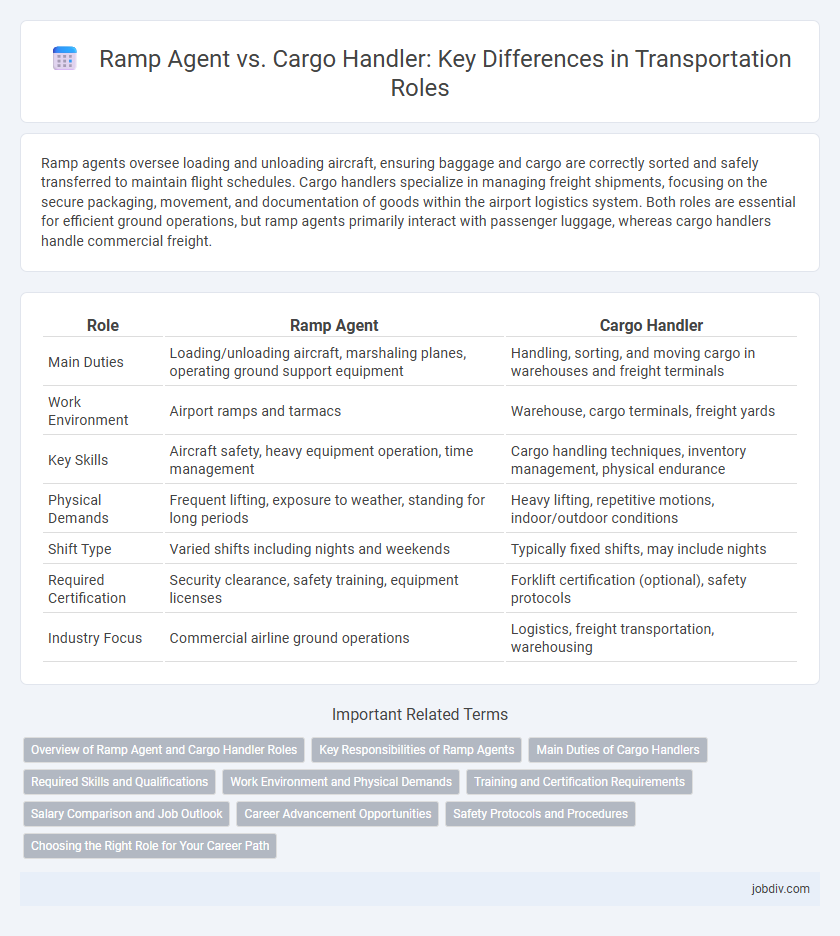Ramp agents oversee loading and unloading aircraft, ensuring baggage and cargo are correctly sorted and safely transferred to maintain flight schedules. Cargo handlers specialize in managing freight shipments, focusing on the secure packaging, movement, and documentation of goods within the airport logistics system. Both roles are essential for efficient ground operations, but ramp agents primarily interact with passenger luggage, whereas cargo handlers handle commercial freight.
Table of Comparison
| Role | Ramp Agent | Cargo Handler |
|---|---|---|
| Main Duties | Loading/unloading aircraft, marshaling planes, operating ground support equipment | Handling, sorting, and moving cargo in warehouses and freight terminals |
| Work Environment | Airport ramps and tarmacs | Warehouse, cargo terminals, freight yards |
| Key Skills | Aircraft safety, heavy equipment operation, time management | Cargo handling techniques, inventory management, physical endurance |
| Physical Demands | Frequent lifting, exposure to weather, standing for long periods | Heavy lifting, repetitive motions, indoor/outdoor conditions |
| Shift Type | Varied shifts including nights and weekends | Typically fixed shifts, may include nights |
| Required Certification | Security clearance, safety training, equipment licenses | Forklift certification (optional), safety protocols |
| Industry Focus | Commercial airline ground operations | Logistics, freight transportation, warehousing |
Overview of Ramp Agent and Cargo Handler Roles
Ramp Agents coordinate aircraft ground operations, including guiding planes during arrivals and departures, loading and unloading baggage, and ensuring timely aircraft turnaround. Cargo Handlers specialize in managing air freight, focusing on the secure loading, unloading, and transportation of cargo pallets and containers to maintain efficient logistics flow. Both roles are vital for airport ground operations, with Ramp Agents emphasizing passenger baggage and aircraft positioning, while Cargo Handlers concentrate on freight handling and cargo safety.
Key Responsibilities of Ramp Agents
Ramp agents are responsible for managing aircraft ground operations, including loading and unloading baggage, cargo, and mail, ensuring proper weight distribution for safe flight. They coordinate with flight crews and ground staff to facilitate timely departures and arrivals, perform aircraft marshaling, and handle fueling and maintenance communication. Their role emphasizes operational safety, efficiency, and adherence to airline and airport regulations.
Main Duties of Cargo Handlers
Cargo handlers play a critical role in airport operations by efficiently loading and unloading baggage, freight, and mail from aircraft, ensuring timely and accurate cargo transfer. They are responsible for securing cargo to prevent damage during flight, operating specialized equipment like forklifts and conveyor belts, and adhering to safety protocols to maintain smooth ground operations. Their main duties also include inspecting cargo for compliance with airline regulations and preparing documentation for cargo shipments.
Required Skills and Qualifications
Ramp agents require strong physical stamina, attention to safety protocols, and proficiency in operating ground support equipment such as belt loaders and tugs. Cargo handlers need expertise in cargo loading techniques, knowledge of weight distribution, and certification in hazardous materials handling to ensure secure and compliant cargo storage. Both roles demand effective communication skills, teamwork, and the ability to work under time constraints in fast-paced airport environments.
Work Environment and Physical Demands
Ramp Agents primarily operate on airport ramps, working outdoors in varied weather conditions, handling aircraft loading and unloading with equipment like baggage carts and conveyor belts. Cargo Handlers work both indoors in warehouses and outdoors on ramps, managing freight, securing cargo, and performing heavy lifting tasks often exceeding 50 pounds. Both roles require high physical stamina, mobility, and adherence to safety protocols in fast-paced, time-sensitive environments.
Training and Certification Requirements
Ramp agents typically undergo specialized training focused on aircraft loading, safety protocols, and baggage handling, often requiring certification through aviation authorities or company-specific programs. Cargo handlers receive training that emphasizes proper cargo securing, hazardous materials handling, and compliance with federal regulations such as OSHA and DOT standards. Both roles demand ongoing certification renewals and practical assessments to ensure adherence to safety and operational efficiency in airport logistics.
Salary Comparison and Job Outlook
Ramp agents typically earn an average annual salary between $28,000 and $40,000, while cargo handlers' wages range from $30,000 to $45,000, depending on experience and location. Both roles have steady job outlooks with projected employment growth of approximately 5% over the next decade due to increasing air travel and cargo demand. Competitive wages and growth opportunities make cargo handling slightly more lucrative, but ramp agents often benefit from additional airline employee perks and advancement paths.
Career Advancement Opportunities
Ramp agents primarily focus on aircraft ground operations such as loading, unloading, and marshaling, providing a solid foundation for advancing into supervisory roles within airport operations or logistics coordination. Cargo handlers, who specialize in managing and securing freight, often progress towards positions in supply chain management, warehouse supervision, or customs compliance. Both career paths offer growth potential, with ramp agents leaning towards operational leadership and cargo handlers towards logistics and freight management.
Safety Protocols and Procedures
Ramp agents follow strict safety protocols focused on aircraft ground operations, including proper signaling, equipment handling, and adherence to ramp area hazards to prevent accidents. Cargo handlers prioritize securing and inspecting freight to comply with weight limits and hazardous material regulations, ensuring safe loading and unloading procedures. Both roles require compliance with Federal Aviation Administration (FAA) safety standards and regular training to maintain workplace safety and operational efficiency.
Choosing the Right Role for Your Career Path
Ramp agents specialize in aircraft ground operations such as loading luggage, directing aircraft movement, and ensuring timely departures, making the role ideal for those who thrive in fast-paced, outdoor environments. Cargo handlers focus on sorting, loading, and unloading freight, emphasizing logistics accuracy and physical stamina, which suits individuals interested in supply chain management and warehouse operations. Assessing your preference for direct aircraft interaction versus freight logistics can guide you to the career path with the best growth opportunities and skill development in transportation.
Ramp Agent vs Cargo Handler Infographic

 jobdiv.com
jobdiv.com